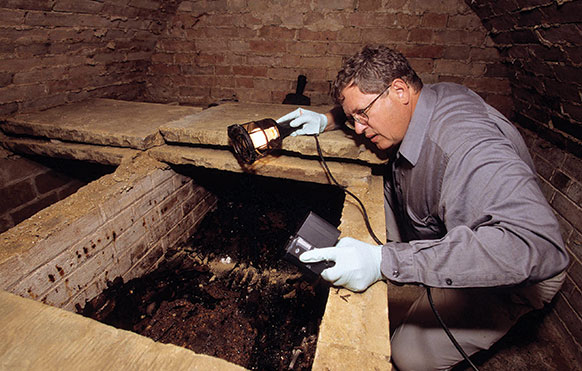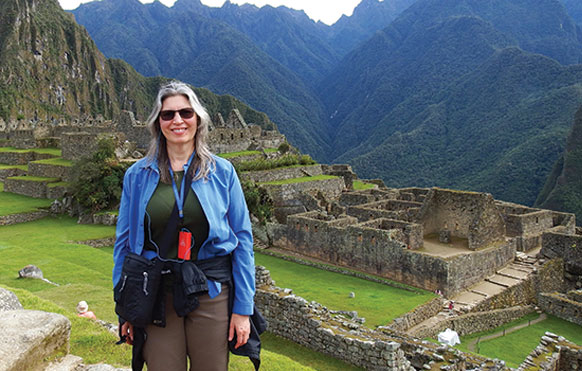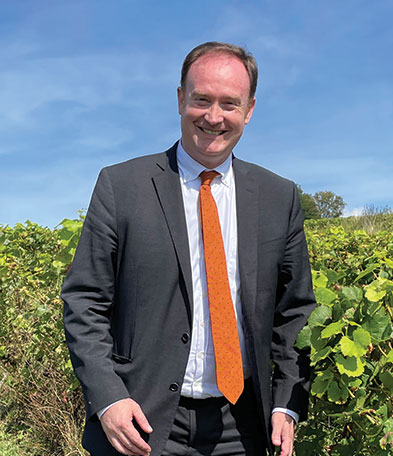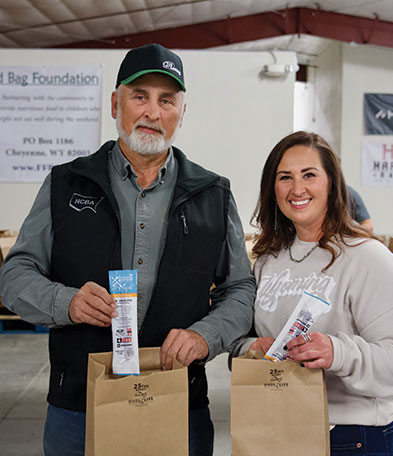College of Agriculture, Life Sciences, and Natural Resources MVPs
Published September 17, 2025

Douglas Owsley (Photo by Chip Clark, Smithsonian Institution)
Smithsonian Curator of Biological Anthropology Douglas Owsley
By Micaela Myers
It was at the University of Wyoming that Douglas Owsley first learned bones can talk
— they can tell you how a person lived, what ailments they suffered and how they ultimately
died.
He’d never considered anthropology growing up in the small town of Lusk, Wyo., where
he met his future wife in line at their elementary school.
“At UW, I was introduced to things that I did not know existed,” says Owsley, who
graduated with his zoology degree in 1973. “At the end of my junior year, I took Introduction
to Physical Anthropology. The professor, George Gill, took an interest in me. He invited
me to go out into the field, including a 1,000-year-old site in Mexico.”
At a conference, Gill introduced Owsley to a leading professor of anthropology at
the University of Tennessee, where Owsley went on to pursue his master’s degree and
doctorate in anthropology. He joined the Smithsonian’s National Museum of Natural
History as curator of biological anthropology in 1987.
“It’s a profession that I’ve been in for more than 50 years, and I’ve had a wonderful
career teaching in universities as well as my work here as a forensic anthropologist,
as a museum curator and as a research scientist,” he says.
Owsley earned the Commander’s Award for Civilian Service from the U.S. Department
of Defense for his work identifying 60 federal and civilian victims who died when
American Airlines Flight 77 hit the Pentagon in 2001. He also earned the Department
of the Army Commander’s Award for Civilian Service for his forensic anthropology work.
“It’s a public service helping families determine what happened to a loved one,” says
Owsley, whose work has also included victims of serial killers. “The person can’t
speak for themselves, so you are their voice.”
His current project involves studying early European arrivals to the Americas.
“I’ve worked on individuals who are from early colonial sites from the 1600s such
as Jamestown and St. Mary’s City — people who really helped shape America,” Owsley
says.
He’s been studying remains from St. Mary’s City, Md., for the past 35 years, including
identifying a man, woman and child buried in rare lead coffins. The information they
can extract is all possible due to technological advancements that Owsley never dreamed
of as a student.
“We’re working on a volume that ties 17th and 18th century sites together,” he says.
“We’re looking at the process of becoming America.”
In addition to their health and cause of death, modern-day testing can reveal what these folks ate and, based on that, where they came from and how long they lived in the New World. Through DNA and genome testing, they can even find living relatives alive today.
“This will be my last major contribution to this field,” Owsley says. “I want the
data to be accessible to future scholars and students. I want students to be able
to go into questions that we’re not even thinking about and use our data to advance
the scientific field. I would be ever so happy if I could see another UW student come
here and work in this office one day.”

Nina Zitani (photo by Oscar Oveido)
Field Research Biologist, Educator, Conservationist Nina Zitani
By Brooke Ortel
As a graduate student at the University of Wyoming, Nina Zitani discovered and named 15 insect species previously unknown to science. Fellow entomologists have named another nine newly discovered species in her honor.
Throughout her career, Zitani has led or co-led more than 30 expeditions to remote
tropical ecosystems. She’s taught field courses in the Amazon, collected thousands
of research specimens and served as an expert for 16 Smithsonian Journeys travel programs,
including an “Around the World by Private Jet” program. In 2021, she was elected a
Fellow International of the Explorers Club in New York City.
But her career as a scientist and international educator began at UW.
Originally from Moorestown, N.J., Zitani moved to Laramie in 1993 to pursue a graduate
degree in entomology. She’d always been fascinated by insects and, after a four-year
stint working at two prominent science museums on the East Coast, Zitani was eager
to expand her teaching and research skills.
She immediately hit it off with Professor Scott Shaw in the UW College of Agriculture,
Life Sciences and Natural Resources “I could tell he was passionate about teaching
as well as research,” she says. “He was looking for someone to send to Costa Rica
to do field research on parasitic wasps. The rest is history.”
With Shaw as her adviser, Zitani earned her master’s degree in 1997, followed by a
doctorate in entomology in 2003. She was also a member of the first graduating class
in UW’s Haub School of Environment and Natural Resources.
On field expeditions in Costa Rica, Zitani supervised undergraduate students in addition
to conducting her own research. In these lush tropical forests, Zitani’s passion for
biodiversity — and biodiversity education — blossomed.
In the field and as a graduate teaching assistant on campus, Zitani quickly became
known for her innovative, enthusiastic approach to education. In 2000, she received
the John P. Ellbogen Meritorious Classroom Teaching Award.
Faculty mentors in UW’s entomology, botany and zoology departments played a key role
in her success, she says. They were “top-notch professors, challenging but also understanding
and forgiving at times when I made mistakes.”
Zitani also helped Shaw launch the UW Insect Gallery, an on-campus resource that’s
still open to students and researchers today. “We had K–12 students from all over
Wyoming come to learn about insects,” Zitani notes. “It was something we did as a
public service — that was part of being a grad student under Dr. Shaw.”
Later, Zitani became a teaching faculty member and curator of the zoological museum
at Western University in Ontario. Inspired by her experience with UW’s Insect Gallery,
she created the Biodiversity Gallery, an exhibition showcasing animal species from
around the world at risk of extinction.
In recognition of her efforts to expand access to the collection and raise awareness
about global biodiversity loss, Zitani received the Green Award, Western’s highest
sustainability honor, in 2022.
Whether she’s teaching in a classroom or on an international trip, Zitani strives
to share her passion for biodiversity with students of all ages and backgrounds. “I
want people to understand the complexity of global biodiversity, that it is essential
for our survival, how incredibly beautiful and wondrous it is, and, importantly, that
it is in decline due to various human activities,” she says.

David Leishman (Courtesy photo)
Agricultural Counselor David Leishman
By Micaela Myers
David Leishman was destined for an international career. Raised in Italy by an Italian-American
mother and Scottish father, he attended high school in Germany and university at the
London School of Economics. But it was his time working at a think tank in Washington,
D.C., that ultimately led him to Wyoming.
“My wife, Karin, is originally from Sheridan,” he says. “At that time, she was working
for the late Sen. Alan K. Simpson.”
The pair married in Moose, Wyo., then enrolled in master’s degree programs at University
of Wyoming — Karin in English and David in agricultural economics.
“It was an incredibly enriching environment,” Leishman says.
He worked on the feasibility of marketing Wyoming hard red winter wheat and on a project
for the Wyoming Wool Growers Association. Leishman also worked as a legislative intern.
After UW, he began his Ph.D. in applied economics at the University of Minnesota,
eventually finishing the degree at Italy’s University of Bologna.
Along the way, Leishman took a job as an agricultural economist at the U.S. Department
of Agriculture in D.C. After short-term assignments in Mexico, Brazil, Poland, Hungary,
the Czech Republic and Italy, he joined the foreign service full time.
“In my first assignment at the U.S. Mission to the European Union, I spent four years
in Brussels helping to negotiate agreements with European counterparts,” he says.
From there, Leishman served as the senior U.S. Agricultural Attaché for India, Bangladesh
and Sri Lanka. He then joined USDA’s trade policy team, helping to lead bilateral
negotiations with South Korea and Morocco. In 2014, Leishman was recruited to serve
as director of the U.S. Agricultural Trade Offices in Moscow, St. Petersburg and Vladivostok.
“I served in Russia for almost five years, living though one of the most challenging
periods in U.S.–Russian relations,” Leishman says. “Our work in agriculture was immensely
rewarding, and I helped forge many lasting relationships, including with one of the
largest meat companies, Miratorg. A group of Wyoming cowboys went there to work side
by side with Russians, teaching them the basics of ranch management.”
Leishman also served as senior director for Africa and the Middle East and agricultural
counselor at the U.S. Embassy in France before retiring from the USDA in March 2025
and moving back to Laramie.
“We wanted to return to our roots, to be closer to family and also to embark on a
new adventure,” he says. “I am so grateful to have had an unbelievable 23-year career
with USDA’s Foreign Agricultural Service, but truly all credit goes to UW. My UW mentors
went the extra mile — believing in me, encouraging me, pushing me and inspiring me
to dream big and to never give up. I am now working for ST Genetics, a global leader
in livestock breeding. I still travel the world, only now I fly out of Laramie Regional
Airport. I am involved in numerous partnerships, and I am especially focused on education.
Our world needs more cowboys!”

In 2024, King Ranch donated beef to create snack sticks for the Beef for Backpacks program launch. (Photo courtesy of the Wyoming Hunger Initiative)
King Ranch Owners Mark Eisele and Kendall Eisele Roberts
By Maya Gilmore
Mark Eisele started working at the King Ranch in the 1970s as a hired hand. After
years of hard work, he earned a partnership in the ranch and brought his whole family
into the business. The King Ranch, located near Cheyenne, is co-owned by Eisele, his
wife, Trudy, and their children Colton Eisele, Kaycee Eisele and Kendall Eisele Roberts.
The Eisele family could easily keep themselves busy year-round managing their private,
state and federal land. But they aren’t content with running cattle and growing alfalfa.
During Eisele’s time as a ranch hand, the owners of the King Ranch emphasized the
importance of a good education. Eisele graduated from UW in 1980 with a bachelor’s
degree in agricultural mechanization, and Eisele Roberts followed in his footsteps,
earning her bachelor’s in agricultural business in 2009 and her master’s in agricultural
economics in 2011.
Eisele and Eisele Roberts have built on the King Ranch’s legacy by supporting UW research
and advocating for Wyoming agriculture. The ranch regularly hosts students studying
subjects from range management to agricultural economics. By exploring the operation’s
inner workings, UW students, faculty and staff can get a practical sense of what it
means to work in agricultural production — and see the real-world impact of research
projects.
The Eisele family helps UW stay on the cutting edge of ranching research and natural
resource conservation. Asked what kinds of conservation projects they’ve carried out
on the King Ranch, Eisele says, “I’m trying to think of what we haven’t done.” They’ve
experimented with rotational grazing, wildlife-friendly fencing, predator management
strategies, renewable energy and much more.
Adapting to new ideas is a core part of the Eisele family identity, but they also
appreciate tradition. Both Eisele and Eisele Roberts are leaders in state and national
livestock organizations, including the Wyoming Stock Growers Association, Wyoming
Stock Growers Land Trust, Wyoming Livestock Board and National Cattlemen’s Beef Association.
Serving in state and regional ranching organizations is a way to support other members
of your community, Eisele Roberts says: “It’s coming together for bigger things than
yourself. I love the sense of working together and collaborating to address issues
that everybody has concerns about.” Eisele adds, “I want to be involved, and I need
to be— because if you’re not at the table, you end up on the menu.”
The King Ranch team also takes any chance it gets to appear in the media, podcasts
or panel discussions. “People want to know who we are, what we raise, what they’re
consuming when they have a steak on the plate,” Eisele Roberts says.
Connections matter to the Eisele family. They’ve stayed involved with UW because they
value the tight-knit community it offers. “It’s a privilege to be able to tell our
story. There’s so many other alumni out there that are doing great things, and it’s
great to be a part of that network,” Eisele Roberts says.
Through the decades, the Eisele family has built up a business whose impact reaches
far beyond their fences. Their efforts help new producers flourish, bring together
communities and lead to new scientific understanding.
UW was a launchpad for their accomplishments. “A good education didn’t ensure success,
but it sure helped,” Eisele says.

